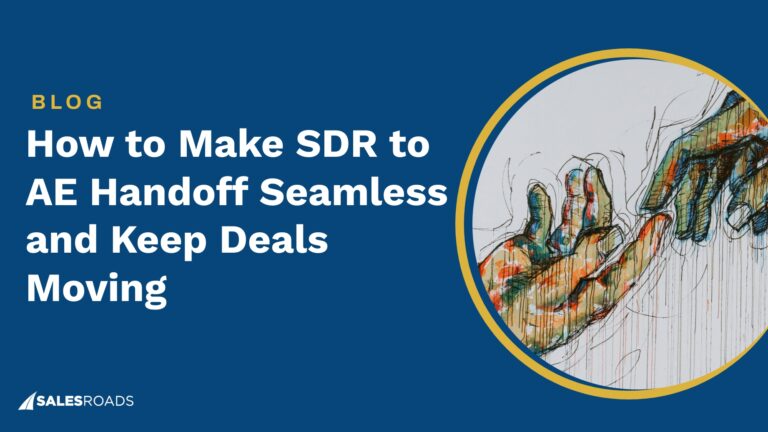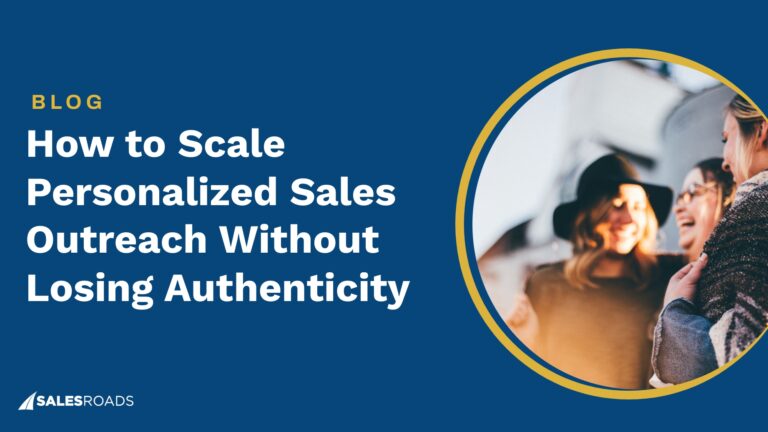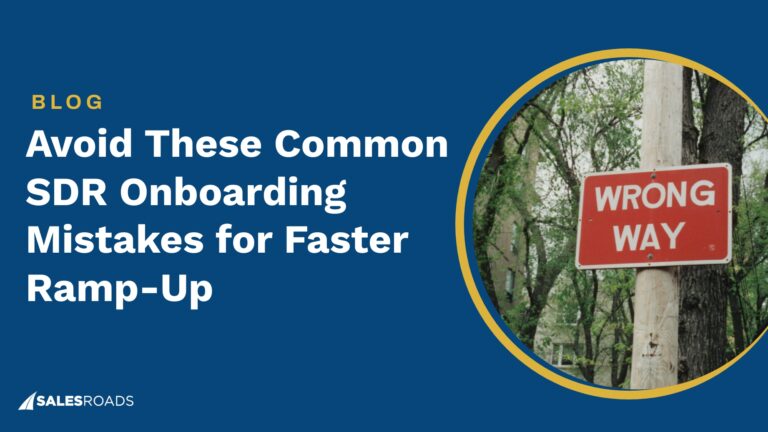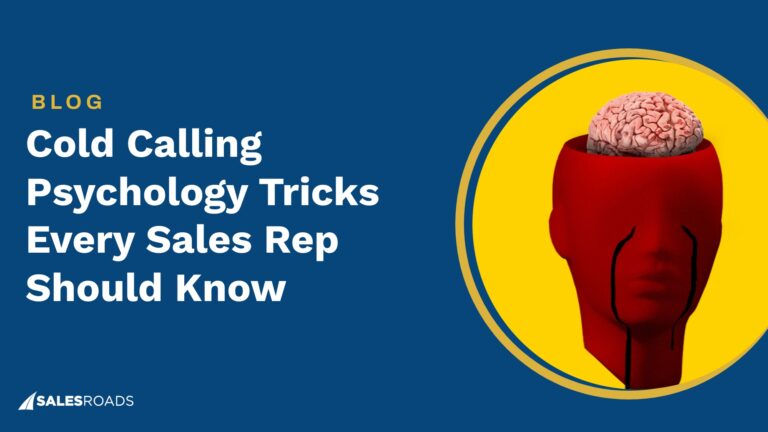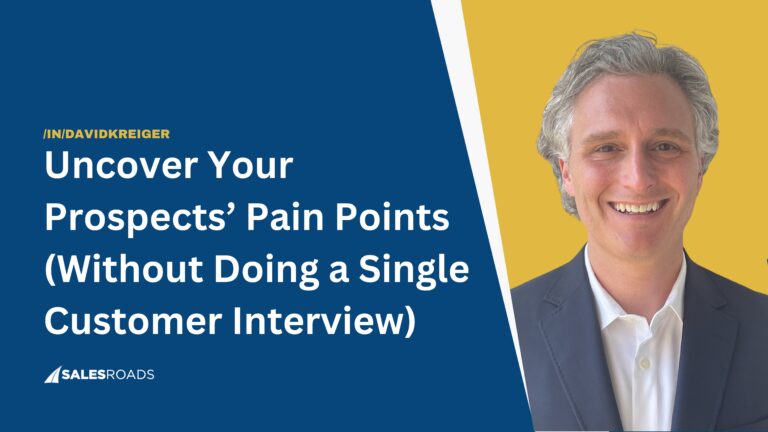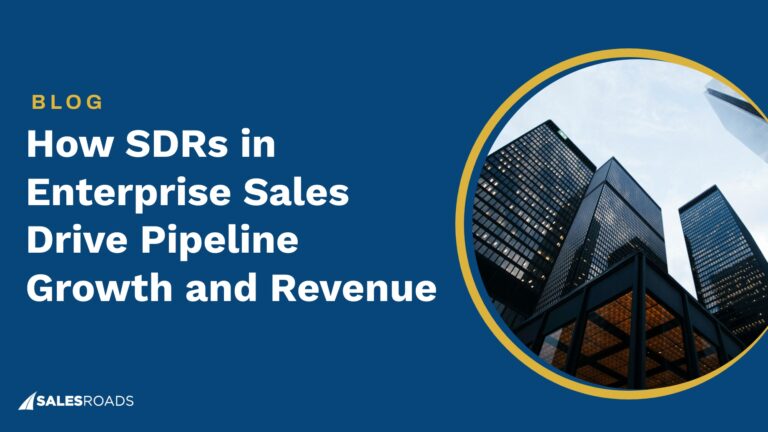Sell Like A Leader – Episode 13
In this episode, we dive into:
– Ecosystem strategy: Three key pillars for entering new markets, the importance of technology partnerships in ecosystems, the role of resellers, using AI and technology to find industry-specific communities, and the power of networking and building contacts.
– Effective sales tactics for new markets: Structuring partnerships and consultant agreements, the role of BDRs in building networks and tapping into communities, leveraging internal and partner networks for warm introductions, and adding value and mutual benefit in sales outreach.
– Rapid Fire Q&A
About Craig Herman
David Kreiger chats with Craig Herman, CRO at Aware where he is responsible for all GTM functions – Sales, CS, Marketing & Partnerships. Craig has more than 20 years of success in driving revenue in several areas, including enterprise software, SaaS, and partner sales, to name a few.
Podcast Key Takeaways
- Craig emphasized the significance of leveraging a sales ecosystem when entering new markets. This includes forming strategic partnerships with technology partners, resellers, and leveraging what he calls “Sherpas” – well-connected individuals or consultants in the new market.
- Craig highlighted the use of both internal team networks and external partnerships to scale entry into new markets. For example, using platforms like Comso to share and map out relationships and contacts within the organization, enhancing the sales and partnership efforts.
- Salespeople are seen as educators and thought leaders, especially in niche markets like biometrics. This involves staying curious, asking the right questions, and providing value in every interaction to build a sustainable network and trust with potential clients.
Connects
Connect with Craig Herman: https://www.linkedin.com/in/craig-herman-aab3/
Connect with David Kreiger: https://www.linkedin.com/in/davidkreiger
Subscribe to the podcast and follow our Podcast LinkedIn page so you don’t miss any episodes!
Transcript
David: Welcome back. This is the Sell Like a Leader podcast, the podcast for revenue leaders who are on a mission to cultivate a high-performing sales team within their organization. I'm your host, David Kreiger, founder of SalesRoads, America's most trusted sales outsourcing and marketing platform. Today, I am super excited to bring you another revenue leader, Craig Herman.
Craig has been Aware's Chief Revenue Officer since August of 2022. He's responsible for all go-to-market motions—sales, customer success, marketing, and partnerships. He has more than 20 years of success in driving revenue in several areas, including enterprise software, SaaS, and cloud. Partner sales just to name a few.
Prior to joining Aware, he was Senior VP of Sales and Account Management at ThreePlay Media, and prior to that had senior sales roles at companies such as 360insights, [00:01:00] Salesforce, and ExactTarget. Craig, I am super excited to have you on the show. Thank you so much for joining me.
Craig: Hey, thanks for having me, David. Yeah, super excited as well. Love your podcast, feel privileged to be on. So, thank you.
David: No, we really appreciate you making the time here. I know you've got a busy schedule. And today I'm really excited to talk about entering new markets. This is something that a lot of sales leaders struggle with, trying to figure out a strategy, what do I do?
And so we're going to really dive deep into a new market that you guys are penetrating and your strategy for going after that market.
And so just to sort of tee us off, can you tell us just a little bit about Aware and then specifically the market you guys are looking to get into right now?
Craig: Yeah. Aware is a really unique company. One, we're in the biometric space. So we are a leading biometric software provider platform, specifically face, fingerprint, voice recognition. As we're seeing this kind of really [00:02:00] taking off in adoption, we're starting to see that in North America.
But when we look across the globe, this is something that is much farther along in other parts of the globe. So Aware has been around for 30 years, but over the last five years, has really gone through a digital transformation into much more of from a project-based build software company to a product-based, meaning SaaS, repeatable revenue, subscription, and low-code, easy-to-install one.
And so this kind of transformation over the last five years, I came in about two years ago to kind of lead that go-to-market piece. So our focus has predominantly been from a company perspective, very government-focused. Think of any three-letter government and then think of biometrics.
So Department of Homeland Security, Border Control, FBI, CIA, those type of folks. But taking that and then rebuilding it into a product that we're selling into the commercial space: financial services, healthcare, and now getting more into [00:03:00] retail and gaming, which are some of the newer markets that we're entering in.
So, taking the tools, rebuilding it into a product that's more manageable, that takes a real customer-centric approach to it.
David: Yeah, that's a really big difference selling into government.
Craig: It—
David: That motion, right? Sales cycles are a lot better moving away from government, right? But it's obviously a very different skillset, a different network of folks. A different, and you brought up as a way that you go into new markets to try to help your team based upon an ecosystem approach, which I think is interesting.
So could you talk to our listeners a little bit about what are the elements of a sales ecosystem and for you, why is that important in entering a new market?
Craig: I've done this at startups and I've done this in more mature companies like Aware, and I think there's some real key pieces that are different, right? When you're a startup, [00:04:00] and you're just entering a new market—your first market—you've got a lot of room to move and try to figure things out.
When you're a more mature company that's going into a new market, it is a little bit different of a challenge. We can't leave the old markets behind, right? So we've got to continue to service, like you said, our government, very different. We're working in LATAM, we're over in the Middle East, and Europe.
So we've got to continue to manage and sell into these markets. But on the other side of the fence, start to really build out into those new markets. And that is where the ecosystem approach is really a focus for us. And I think that is one of the ways that you can take what you've learned in these other markets and bring it into a new market. But also, unlike a startup, you've got some things to lean on.
Hey, this is what we've done in this market. This is what we can point to. And when you throw out like, yeah, DHS, or when you came into the airport, our software was part of that solution—that gives you some credence when you're talking into a new market. Online gaming, [00:05:00] which is one that we've focused in.
So the ecosystem play—that can mean a lot of different things. And I think when you're in a more mature market, the ecosystem is much more of a circle, meaning we're able to give as much as we take. When you're getting into a new market, it's a little bit more on the take side, meaning we don't have leads that we can show that we're going to bring folks into deals, other partners into deals.
So what we look at are three big areas in the new market from the ecosystem. The first is technology partnerships, right? Or—what do we need to integrate in with that’s going to give us a differentiator in the market, give us better target.
Say, you know, for us, you're gaming—and I'll use online gaming as one of them, because we're very knee-deep in that—you know, there are some very specific e-commerce platforms out there like WooCommerce, which is part of WordPress, that a lot of gaming companies use, right?
So having a productized integration that's a plug-and-[00:06:00]play. Now we're doing two things. One, we're entering into this gaming market, but now we're also even narrowing the market that we're going after and saying, Hey, if you're using WooCommerce, we've got an integration. And then these are all the other things that we do really well on the biometric side, and those pieces.
So first, we really use that integration—those technical partnerships—as a way to differentiate but also get targeted.
One of the challenges going into a new market is, there's a lot of shiny toys and a lot of ways that you can start running down, right? You should have a good idea of your personas and ICP and those things that you're building out. But where do I start? So, first one—really help us give that product differentiation.
The next is—what are the resellers? Who are the resellers in that market?
It's great if you have some resellers or VARs. If we have folks that are in an ancillary market that we've worked with, we definitely want to use them as a core driver or someone [00:07:00] that we want to partner with.
More often than not, the same partners don't cross over. Partners are usually very specific about their market. So, how do we get in? Creating a demand gen for partners within that market is just as important for us as the direct demand gen into that market.
Because what that partner gives us is something we don't have in that market, which is credibility and understanding of that market. And when I say understanding, it's not just the research and things that you do, but the nuances of the market. When people buy, why they buy, what's the cycle?
What are the things that are—what are the pains and things along those lines? So they can be a huge piece of it.
And then the third one is—this is what we call our Sherpa. These are folks that are very networked in. They could be a consultant, they could be someone that is an ancillary product, but what they're going to do is help us talk to the right people, get in front of the people on the direct side, right?
So [00:08:00] who should we be talking to? These are what you need to know. These are the people that we need to be—these are the events that you've got to be at, right? I use Sherpa term because you walk into that market and you're like—for us, gaming, there's a ton of gaming, right?
And when we first walked in, you start to learn a lot of the legal pieces that we have. Legal terms here versus what's happening in Brazil versus what's happening in Europe are all very different. So having someone that kind of really goes arm-in-arm—and those folks are typically pay-to-play, right?
So they're part of the ecosystem and they're helping generate meetings, the right contacts, and the right focus. So those are really the three big components that we look at from an ecosystem.
David: So that's interesting. So basically, you've broken down your technology partners and you are looking at those to see who can both augment the service that you're offering and also obviously selling [00:09:00] into the same types of customers. Your resellers and then your Sherpas, who are more individual contributors, is really the difference between a Sherpa and…
Craig: Well, yeah, Sherpa could be like a consultant. So we have a consultant that has a team that they're focused in the gaming space, right? So they work with a lot of different players, operators in gaming, people who are starting online games for the first time, go to these folks to help them with how do I market it? How do I do it?
And they'll also, hey, what technologies do I need, right? So they're kind of Sherpa, door opener, things along those lines that can work pretty closely with our direct sales team and our partner manager.
David: If I'm a sales leader and I'm thinking in terms of these three buckets, how do you then define the strategy as to who to go after in these buckets? Is that something that you design, or do you often bring in a sales leader or a sales contributor to go after these buckets? How do you actualize figuring out your targets [00:10:00] here?
Craig: This is where product, our team on the product side, right? So what is our value prop for going into this market, right? What do we know about the market? All of the research that's done, that's typically, it would be myself, the leader of marketing, and the leader of product, kind of putting together, okay, this is the market.
This is what we see, usually bringing in some outside research. And talking to potential customers, or if we happen to get a couple of customers in there, that type of research. So we get a sense of this is the market we want to go into, and this is why, right?
And I think the next is a bit more tactical and okay, what's the first step now. And we look at it, Sherpa is probably the best first resource, right? And they're going to help with, hey, this is what a lot of people are using for e-commerce, this is what a lot of people are using for marketing.
So this is what you should help, you should integrate in. And then teaming that person up with a [00:11:00] BDR salesperson, how we want to build it out. Typically, we go a BDR salesperson and then Sherpa partner manager resource when we go into a new market. Hiring a person specifically for that market is, again, a piece of the strategy. I wouldn't put it into the ecosystem. I mean, it's part of our internal system, but that is absolutely a piece of it.
David: That's interesting. And you're leaning on the Sherpa, that consultant, to be that category leader to help you at the beginning. So starting actually in that order is interesting because you find that consultant, they understand it, they've got a strategic mind, you figure out a partnership with them.
And then how do you leverage, once you've figured out, how do you structure a partnership with them? And then I'm just curious, obviously because we do SDR outsourcing, curious, how do you lean on the BDR once you've structured that partnership with them?
Craig: Yeah. So, the structure that we typically use is a flat monthly fee and then a percentage of sales. So in some cases, these [00:12:00] folks are actively out setting meetings for us.
In some cases, they're taking a very much like, hey, I'm the consultant, I'll guide you the right way. I'll introduce you to some folks, but you take it from there. So it kind of depends on the resource. We typically like them to really understand what we want to bring to it, things along those lines.
So that's a key piece. The other piece is when we're having that sales rep involved, so they're learning, what should I be focused on? How should I be positioning our product versus others? What are the big drivers for someone to make a change versus staying with the existing platform?
And then, for us, there's a lot of education around biometrics because you say biometrics and it freaks people out right out of the gates, right? Oh, someone's taking a picture of me as I'm walking through something, and then they're doing a full background check.
And what we really do — and there definitely are players out there that do that — but what we're really focused on is just making sure that the person who is, we say, who is coming in trying to say who they [00:13:00] are, we're just proving that's correct, right?
So if I show a license, I'm making sure that Craig Herman is the same person that's on that license and the license is real, right? And that's what we're doing. And with deepfakes and things along those lines that are happening, there's a lot of education around this.
So first, it's, hey, your data is going to be secure. There's nothing stored on our site. No one's going to steal your face and go running around faking it. And then there's the other component of why it's so much better than passwords or MFA or some of the other tools that are out there. So there's a lot of education that has to take place.
And that's where we really lean on the sales rep to take that on, right? We have a view of our salespeople as they are thought leaders and they are educators, right? And that is a big piece of what they do. So they need to understand the market. They need to understand our products. And they need to understand the customer's market.
And I think that's where finding a person that [00:14:00] has all three of those right out of the gate — probably going to be pretty difficult — but you want two out of three and then try to train up that third piece. The BDR is someone that we have gone through a bit of a transformation on.
What I would have termed a BDR maybe 10 years ago — our BDRs are much more tech expert or tech enablement, right? They're absolutely doing calling, but what we're doing a lot more today is getting really targeted, finding the right people, working through them on social media, leveraging things like AI — not just like a Salesloft and sequencers — but also getting much more into what communities do I need to join, where do other people hang out that are part of this group.
And to use the gaming example, there's a ton of them, right?
So Sherpa is going to be able to give you some guidance. And then our folks — the BDR and the sales rep — really use both technology and their expertise to go into that market.
David: Yeah, then that becomes another [00:15:00] extension of ecosystem sales. So with the BDRs, they're not just doing straight cold calling. They're actually trying to tap into mini ecosystems around where your potential customers are going to hang out and share information. And then there's continuous learning through that as well as you're entering a market. So I think that's a really interesting sales strategy.
Craig: Yeah, it's not to go off on a side tangent — how sales has really changed over the last 20 years — but how we're starting to come back to some of the old foundational things where you would… I know that's an old term, but we're starting to get back to, what does your network look like? Who do you know? Because when I'm buying something, I go to people that I trust and I know first, right? And that's where the really good leads come from — referrals, right? The best opportunities, the best deals, the best customers usually come from a referral.
David: [00:16:00] Craig, are you using any technology to empower your ecosystem strategy?
Craig: Yeah, we have just started working with a company called CommSort. This platform is really unique in that what we're able to do is sign up everyone inside of our organization, and you can see everyone's contacts and then the strength of their contact, how often they've interacted, things along those lines.
This platform gives all that information so a rep can go in, search an account, and then see it and then reach out to the owner of that relationship and ask for an intro.
And we're really looking at taking this — right now, using that to try to connect to people — but also as we expand our ecosystem, and when we started to talk about our partners, especially the ones that we're really integrated in, getting them into our CommSort group. So then we're actually expanding our partner network.
So now we're sharing more and more contacts of: these are people that we've worked with, these are people in my network — maybe in the market, maybe outside, or in a different market. And so we [00:17:00] really look at, you know, how can we do some of the things that we're doing one-offs and scale it? And we're really going to use this as a way to kind of build an Aware community around biometrics and what's happening in the industry from a security perspective.
David: I think that's brilliant. I mean, that really takes all those pieces of the ecosystem that we talked about and is a way to bring it all together. So it's not just in somebody's mind—oh, you know, and thinking about, oh, who do I know? How can I help? Where should I go? You actually can create a methodical process around: who are the people that we need to be able to leverage to be able to get into this company?
Because as we all know, you can do all the cold prospecting and best networking in the world. But if you have a warm intro and you have somebody who even loosely has worked with someone there, that is worth gold compared to just doing a cold outreach. So I think that's an amazing way to bring the whole ecosystem together, Craig.
David: That actually leads me exactly to where I wanted to go. When you're going into a new market, you [00:18:00] start bringing in account managers, AEs, to help you go into these. How are you looking at their network? And then how do you coach them and make sure that they're leveraging their network as you're trying to go into these new markets?
Craig: Yeah, when we're hiring, of course, I'd love to go out and find someone that has sold biometrics into the gaming market and has a huge network, but that's probably not someone that we will be able to afford. And so the type of person that we have, specifically in our gaming market, one, they came in without the network. So they've leaned very much on the Sherpa.
But they understand how to build a network. And I think that's just as important as having a network is how do I build a network, right? How do I work with people for the overall enrichment, meaning, I'm not just what I need, but what can we bring? And I think that's a really good network or a community builder.
It's not just focused [00:19:00] on the sale, right? It's how do I build out all these things around it so that the sale is eventual. So, how are those folks buying? How does that rep build the network?
And do I need someone that really understands a very long 18-month sales cycle, that's going to have a lot of ups and downs, enterprise, a lot of legal and technicality, then I'll probably lean more on their understanding of the market. I've had some really great luck with people that have been working in marketing and said, I'd really like to be in sales.
And then I think there's other ones that are much more welcoming. Online gaming it is a very welcoming group. They are anxious to learn about new technology. They want to meet new people. You know, this entire market is kind of new, right?
And so everyone is used to that versus banking, government, which is very different. So it depends on the market and the targets as well.
David: So we're starting to run out of time, but before I just wanted to finish with this because it's not like [00:20:00] always a clear sales motion when you are doing networking, when you're going into communities, things like that.
Can you give a few principles, either from like the way that you coach your team or the perspective they should have? Are they going into these communities and trying to find ways to help people, when they're reaching out on LinkedIn, are they trying to do to be able to build their network?
Craig: Yeah. Um, there are a few things. One, I think, is to be your true self, right? And to be transparent. I think people, we hear it all the time in books, right? People want to help other people, right? And asking for help. Hey, I'm trying to get into this market.
I want to join this group, or I want to be connected. Here's what I'm trying to do, right? Being transparent. I think people appreciate that. Two, you've got to add value, right?
And that's what we talk a lot about. So, if you are getting someone's time for 15, 30 minutes, what value are you bringing? Because just going to pick their brain or get information, like that's not a true network, right? How can you educate them? People want to know about biometrics.
They want to [00:21:00] understand the difference of some of the stuff that we talked about. So, making sure that the people that you're engaging with, you can bring something to that conversation. And then, again, the mutual benefit, right? How can I help, as well as how can you help me?
And I think, with any relationship, those are really some pretty key components: transparency and communication, being valuable. And then, just making sure that there's a mutual benefit.
David: That's great. I think that is a really clear roadmap of ways that people can break into a new market. And I think really leaning on the ecosystem. A lot of folks have been there before, and so leaning on their know-how, their Rolodex, their sales infrastructure with VARs.
So, trying to do this by yourself is potentially a fool's errand, or at least is making it much harder than it should be. So I think those are some really great perspectives, Craig. We like to just ask some rapid fire questions just to get some general perspectives from the sales leaders we're talking to.
So, you mind if I fire a few at you?
Craig: Let's go. What do you got?
David: [00:22:00] So first, what is the one thing people don't give enough value or attention to in leadership?
Craig: The privilege of leadership. I think this is, especially in my earlier days when I first started to get into a front-line management role, just the impact that we have on so many different lives. And I think sometimes we take it for granted, the role that we're in, and just how much is dependent on leadership.
What we're doing on a day-to-day basis and the privilege of being able to lead people. It's something I'm very grateful for. It's the piece that I enjoy the most about what I do. But it is a privilege. And I think that privileges have to be continuously earned.
I really think we forget that sometimes, when we're so focused on all the other things that we're doing. And the people that we're leading, the dependence and the importance of what we're doing sometimes get lost in the day-to-day of chasing a number.
David: Yeah, I think we all can point to that one mentor who really changed the [00:23:00] trajectory of our careers or at least our philosophy. Uh, and it's so important. Um, what's one skill you can advise everyone in sales to master?
Craig: Yeah, I gotta go two. It is having a curious mind and working on it. I think people genuinely feel that curiosity is something that you're just born with, but really having good questions and really being interested in
what their business is doing.
And the other part of this is storytelling. And I think that is such a key piece for sales folks. Being able to tell a story based on what you know, and I think the more you know is, the questions you ask.
David: Love it. Favorite business leadership or sales book?
Craig: I would definitely go Extreme Ownership. Um, it's one of the books that Jocko Willink wrote. Five Dysfunctions of a Team by Patrick Lencioni is one of my re-reads. And then David Priemer's Sell the Way You Buy is, for me, one of the great just pure sales [00:24:00] books.
You say ask for one, I gave you three. But those are ones that I'm constantly opening and rereading, and reminding myself.
David: You know, you've got a giver mindset. You want to give more on any one of these questions. So, favorite quote, mantra, or saying that inspires you as a sales leader.
Craig: Yeah, that's an easy one. Control the controllables. Control the controllables. We're very dependent on sales and even sales leaders on a lot of things that are outside of our control, but if we do the things that we can control even better and fine-tune that, the other things fall into place.
And it also helps focus and clarify, right? Simplify and clarify, and focus just by saying that mantra, what can I control in my day?
David: Helps us lower our anxiety, too.
Craig: Absolutely. Yeah, sometimes.
David: And lastly, what's the most important goal or project you're working on right now?
Craig: We are building this partner ecosystem. So I, you know, I mean, not to, uh, you know, because it's top of mind, but also [00:25:00] coming in. My last three organizations, building out a partner and an ecosystem has been forefront. Bringing in really capable, great people and putting in the operations around it, the foundations, the enablement, all of those pieces.
Because I think a lot of times people have a partner program, and it's a website with some content and a partner manager that's out there trying to do it. But really, creating an ecosystem that is that full circle is something that we are heads down, knee deep in right now.
So that's definitely the one that pops up and really is a big piece for us as we continue to go forward, and how we're going to grow.
David: That's fantastic, Craig. I want to thank you again for taking the time to be on the podcast today. I got a lot of great knowledge bombs here on go-to-market and creating a breakthrough as we move into different markets at organizations. And so Craig, with that, where can folks find you [00:26:00] or learn more about Aware?
Craig: Sure. So aware.com is our website. And obviously I'm on LinkedIn and then cherman@aware — my email — and, uh, Craig A. Herman on X. Um, but I'm not on there as much as I used to be. So, but, uh, yeah, definitely those are the big areas.
David: Fantastic. Thank you, Craig. Really appreciate it. And listeners, thank you so much for listening to another episode. If you like what you heard here, don't forget to subscribe on your platform of choice. And please always feel free to reach out to me on LinkedIn with any thoughts, feedback. Always love to hear from our listeners.
Thanks so much.


